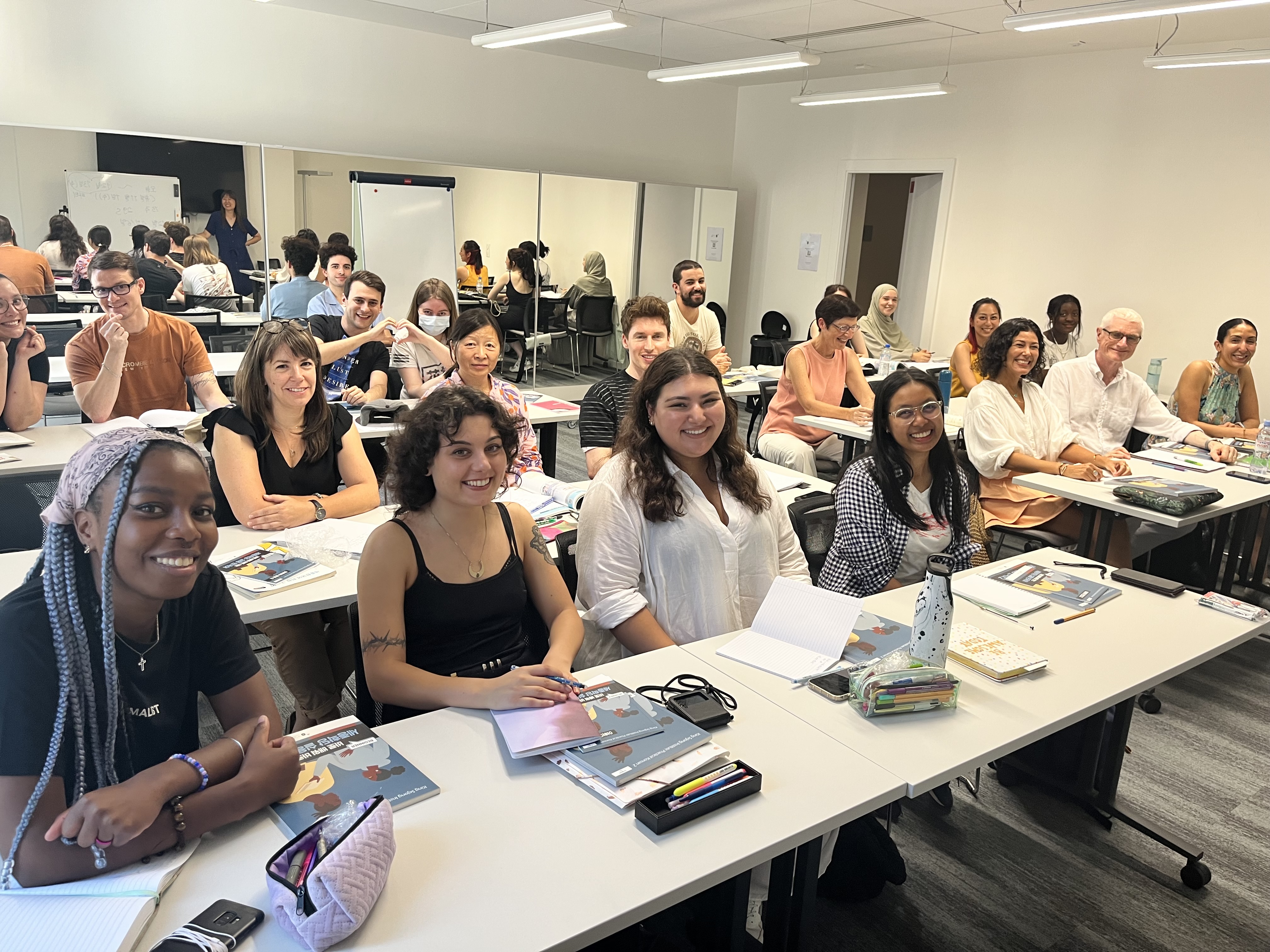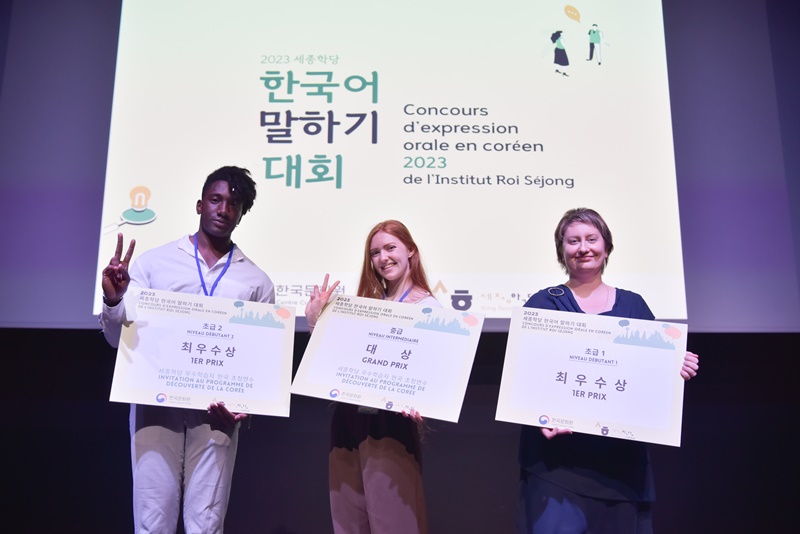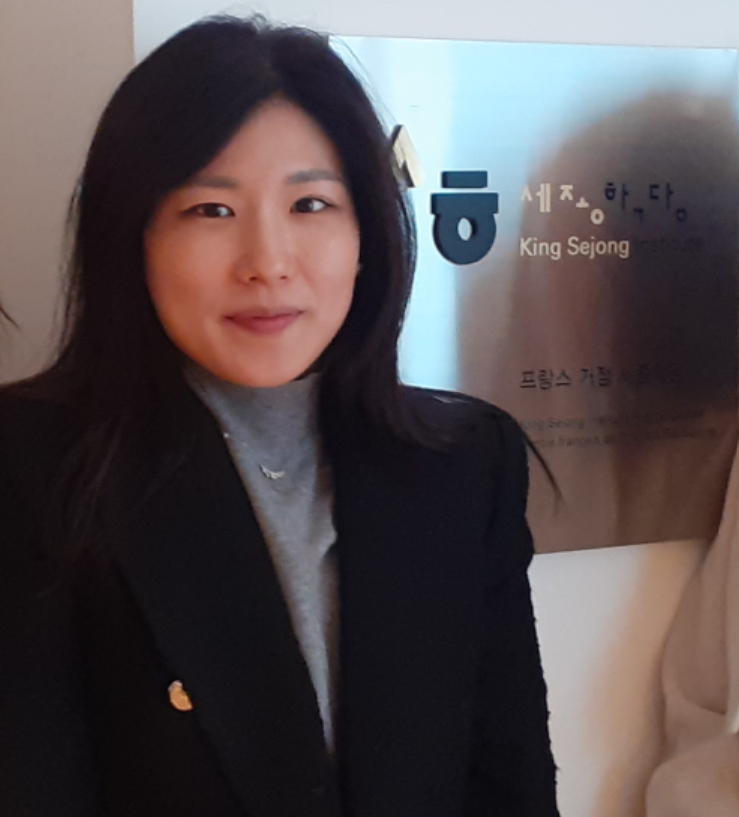
About 20 French students on Sept. 5 take a Korean-language course at King Sejong Institute Center of France located at Paris Korea Center in the eighth arrondissement of the French capital.
By Charles Audouin and Jung Joo-ri
Photos = King Sejong Institute Center in Paris
"The number of students is increasing every semester. In the second half of last year, 209 students took Korean-language courses at King Sejong Institute Center (KSIC) in France, and that number rose to 292 in the first half of this year and over 400 in the second."
This is according to Shin Yeonji, general director of KSIC, which supports the operations of 57 King Sejong branches in 27 European countries.
Opened in December 2021, KSIC has offered Korean-language education for three consecutive semesters since the second half of last year.
Among countries on the Continent, France has shown the highest interest in learning Korean.
According to the Test of Proficiency in Korean (TOPIK) Center and the education section of the Korean Embassy in Paris, the number of people in France who took TOPIK jumped over 250% from 292 in 2018 to 780 last year.
France topped 16 European countries in the number of TOPIK takers, surpassing Germany (626) and the U.K. (506). Excluding Asian countries, where demand for Korean is highest, France is also No. 2 in the number of TOPIK takers after the U.S.
In a written interview with Korea.net on Sept. 28 to mark this year's Hangeul Day (Oct. 9), Shin said, "We have many students of Korean who try to naturally learn the language in going beyond being Hallyu (Korean Wave) fans in the process of getting to know Korea."
The following are excerpts from the interview.
What courses does your institute offer?
We use textbooks, teacher guides, workbooks and mobile apps developed by the King Sejong Institute Foundation to provide a detailed curriculum of an introductory course on Hangeul and four beginner and three intermediate levels.
A survey of students found that their interest in the Korean language and culture and purpose of traveling to Korea were common reasons for learning the language, so we will launch special courses on Korean for tourism and others on pronunciation in conversations in the language. We also offer interactive programs on Korean culture such as calligraphy, Hanbok (traditional clothing) and Hansik (traditional food).
What differentiates your institute from others that teach Korean?
French Alliances (Alliances Francaises) is a French-language education brand with official recognition from the French government. King Sejong Institute (KSI) is a Korean-language education brand officially recognized by the Korean government.
One of our features is outstanding instructors and textbooks. All KSI faculty have either a Korean-language teaching certification or have completed a training program for Korean-language teachers.
Sejong Korean, a textbook exclusively used by KSI, was developed by the National Institute of Korean Language and is the world's most extensively used book of its kind in Korean-language education.
I believe that a brand accredited, certified or developed by the government has sufficient credibility. We also provide interactive programs on Korean culture to offer the opportunity to understand Korea more deeply through language and culture in addition to language classes.

The winners of this year's Korean Speaking Contest on June 2 take a group photo at Paris Korea Center in the eighth arrondissement of the French capital, where King Sejong Institute Center of France is located.
What kind of students does your center have?
We have a wide age range among students from those in their teens to 70. A high percentage of students learn Korean due to interest in Korean culture or the language itself rather than doing it for specific purposes like finding a job or studying abroad.
Based on a survey of registered students at our institute, the highest percentage of students learned the language to better understand Korean culture at over 20%. In fact, many learn Korean to better enjoy Hallyu like understanding K-dramas without subtitles and singing along to K-pop.
What do French students find most interesting and difficult when studying Korean?
One student at the beginning level called Korean the most beautiful sounding foreign language with a soft and warm feel. Others say what interests them most about Korean is learning expressions unique to the language.
On the other hand, students say it's hard to express themselves in Korean compared to their listening and comprehension levels, though this is true when learning any foreign language. This requires a lot of practice, so some students hold review meetings with one another or do language exchange on an individual level with Korean students in France.
What students are the most memorable for you?
There is a student who grew interested in Korean history after hearing about it in a class for international relations majors and has since studied the language regularly. The student's goal is to become a diplomat and work at the French Embassy in Seoul.
Another is an elderly student age 71. On our evaluation test at the end of every semester that even young students find difficult, this student got a high score.
How is awareness of the Korean language and culture changing in Europe?
Interest in Korean culture began in Europe with K-pop, films like "Parasite," and K-dramas such as "Squid Game" and "Extraordinary Attorney Woo," and their popularity has widely spread.
There are now people who want to go beyond being Hallyu fans and try to naturally learn the Korean language in the process of learning about Korea.
Finally, what are the goals and plans of your institute?
King Sejong Institute Center of France seeks quantitative growth by backing Korean-language education institutions throughout Europe as well as France and expanding the dispatch of teachers and pursues qualitative growth by raising the expertise of teachers in each country to boost Korean-language education in the European region.
We ask for your interest and support so that our institute can play a central role in disseminating the Korean language and culture throughout Europe and lead active cultural exchange between Korea and the Continent.

Shin Yeonji is general director of King Sejong Institute Center of France in Paris.
caudouin@korea.kr